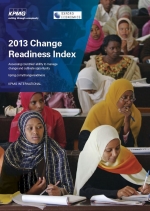Ungated Post | 18 Sep 2013
2013 Change Readiness Index

KPMG’s 2013 Change Readiness Index (CRI), produced in partnership with Oxford Economics, ranks 90 countries, measuring them across 26 components to compare capabilities in the areas of enterprise (business environment), government, and people and civil society (social and human capital). The study is unprecedented in its scope and unique in its consideration of change readiness.
The countries ranked highest in the CRI reflect a diversity of locations and size, while sharing many of the same qualities essential to change readiness: dynamic business environment, stable and effective governments, skilled populations, and strong civil societies.
Visit Change Readiness Index home page
Use Change Readiness Index Tool
Oxford Economics’ team is expert at applying advanced economic tools that provide valuable insights into today’s most pressing business, financial, and policy issues.
To find out more about our capabilities, contact:
Americas
Diantha Redd
+1 (646) 503 3052
Email
Asia Pacific
Peter Suomi
+65 6850 0110
Email
EMEA
Aoife Pearson
+44 (0)203 910 8054
Email
Related Services

Post
The economic impact of abandoning the WTO
Oxford Economics have been commissioned by the International Chamber of Commerce (ICC) to provide an independent assessment of the economic impact of WTO dissolution. This report details our findings and the assumptions underpinning our analysis.
Find Out More
Post
The economic impact of the sports activities of public service media
This study shows how the sports activities of public service media supported €4.5 billion of GDP and 57,000 jobs across 31 European countries in 2022. The report also highlights wider economic benefits of public service media sports coverage, such as the way in which it leverages sponsorship income for sports bodies.
Find Out More
Post
Global Trade Education: The role of private philanthropy
Global trade can amplify economic development and poverty alleviation. Capable leaders are required to put in place enabling conditions for trade, but currently these skills are underprovided in developing countries. For philanthropists, investing in trade leadership talent through graduate-level scholarships is an opportunity to make meaningful contributions that can multiply and sustain global economic development.
Find Out More